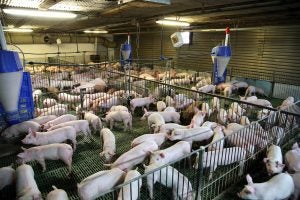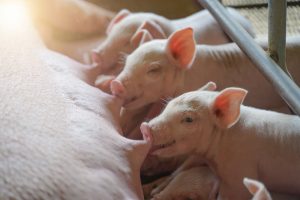Yesterday, the Supreme Court of the United States heard oral argument on NPCC v. Ross from a lawsuit challenging California’s Proposition 12, a law that bans the sale of pork from hogs that don’t meet the state’s production standards.
The arguments remain two-sided. While the American Farm Bureau Federation and National Pork Producers Council challenge the constitutionality of California’s Proposition 12, largely based on the impact it would have on interstate commerce, supporters maintain that the law, passed by voters in 2018, protects animals from “cruel” and “extreme” confinement.
Although California accounts for 13 percent of the nation’s pork consumption, the state is home to relatively few pig farms. Pork producers have been pushing back since the proposition’s earliest days, worried about the costs to both farmers and consumers and the lingering questions of whether it would increase animal health at all. The law, which was to go into effect Jan. 1, 2022, requires more space for breeding pigs and will force a $26 billion-per-year increase in costs to pork farmers.
In 2021, the California Department of Food and Agriculture admitted that the self-titled Prevention of Cruelty to Farm Animals Act would increase pig mortality on breeding farms and had no positive impacts on human health and welfare, worker safety, or the environment.
“October 11 is a historic day for both my fellow pig producers and me. Operating with a constant backdrop of uncertainty, new and pending legislation makes it difficult to run any business, let alone a farm. Prop 12 is not good for my animals, it’s not good for the consumers, and it’s definitely a challenge for the future of farming,” said Terry Wolters, president of the National Pork Producers Council during a media briefing following the SCOTUS hearing.
Here are some of the conflicting arguments:
Is Proposition 12 Constitutional?
Timothy Bishop, a lawyer from Mayer Brown L.L.P represented the NPCC and the AFBF. Arguing the constitutionality of Prop 12, Bishop told the court that the law violates the Commerce Clause and fails the Pike balancing test.
While the Commerce Clause gives Congress the power to regulate trade among the states, it also restricts states from regulating commerce outside their borders. The only exception? These matters affect public health and safety (see the CDFA’s release).
The Pike balancing test references a case from 1970, Pike v. Bruce Church, in which the Supreme Court found that the burdens a state or local law imposes on out-of-state commerce must not be excessive compared to local benefit (see again the CDFA’s release).

Bishop told the court that the cost of compliance with Proposition 12 to producers would be immense. Despite the impact of a ban by California, Bishop argued that bans are focused in-state, commonplace, and reduce the size of the market for out-of-state businesses — not tell companies how to conduct themselves.
“We’re talking about the impact on the state where the business is located,” he said. “Iowa has 65,000 sow farms. It has a very great interest in how those sows are housed.”
Pork producers argued that California’s projected legislation into other states impedes national markets, setting a precedent where one state regulates the actions of another. In support of NPCC and AFBF, U.S. Deputy Solicitor General Edwin Kneeler said Proposition 12 is invalid because it, imposes a trade barrier based on conduct beyond California’s borders. It fails to respect the autonomy of California’s sister states. It invites conflict and retaliation and threatens the balkanization (or fragmentation) of a national economic union.”
California’s Solicitor General Michael Mongran argued that Proposition 12 does not place restrictions on out-of-state pork businesses, saying, “If [a state] adopts a regulation that is just too burdensome to comply with, then the industry will stop serving a state, and the state has to decide, ‘Do we want a regulation or do we want pork?’ ”
Bishop maintained, “If California can condition sales on its moral or policy views, and every other state can do the same, we’ll be back to the pre-convention picture where you have balkanized markets and discord among the states.”
What about animal welfare and consumer choice?
Proponents of Proposition 12 argued that the law does not affect interstate commerce, simply the sale of pork products in California. Products that Jeffrey Lamken, speaking on behalf of the Humane Society of the United States, said, “Californians find immoral and unsafe, regardless of where it originates.”

NPCC Chief Legal strategist, Michael Formica, argued in the NPCC’s press briefing, “Some of the California voters voted for this, but we have pork producers here on our board and other pork producers in the courtroom today, who every day wake up with a moral imperative to care for their animals, to raise those animals sustainably and then ultimately to produce food that feeds everyone and in a fashion that everyone can afford to eat it.”
But, producers argue that if the moral wills of one state are pushed on farmers from other states, pork production and prices will have a tremendous impact.
“If a farmer were to go and change their operation to comply with Proposition 12, what is there to stop New York from turning around in two years and say it’s not 24 square feet, it’s got to be 26 square feet? And then, two years after that, California goes back and says, let’s make it 30 square feet,” Formica said. “If there’s real market demand, we’ve got this thing called the free market in this country, and it’s amazing. If there’s demand, supply will follow.”
“We have a robust, safe food safety system in the United States. The most abundant supply of food in the world, and the safest,” Formica said.
In the spring of 2023, the Supreme Court will decide if California should be able to make choices for other states. Do California’s morals allow the state to place regulations on pork products that are already inspected and certified by the U.S. Department of Agriculture? Or will producers continue to make choices based on the recommendation of their state’s veterinarians and consumer preferences across all pork-consuming states in the U.S.


